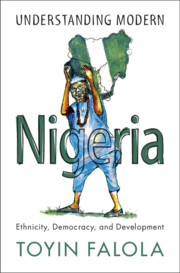Book contents
- Understanding Modern Nigeria
- Understanding Modern Nigeria
- Copyright page
- Dedication
- Contents
- Figures
- Maps
- Preface
- Acknowledgments
- Part I Introduction
- Part II Context and History
- Part III Democracy and Governance
- Part IV Development Crises
- 11 Corruption
- 12 The Political Economy of Oil
- 13 Environment and Sustainable Development
- 14 Food, Society, and Human Capabilities
- 15 Women’s Marginalization
- 16 Human and Minority Rights
- 17 Political Violence
- 18 Challenges of Western Education
- Part V Reforms and Revolutions
- Part VI Conclusion
- Bibliography
- Index
13 - Environment and Sustainable Development
from Part IV - Development Crises
Published online by Cambridge University Press: 09 June 2021
- Understanding Modern Nigeria
- Understanding Modern Nigeria
- Copyright page
- Dedication
- Contents
- Figures
- Maps
- Preface
- Acknowledgments
- Part I Introduction
- Part II Context and History
- Part III Democracy and Governance
- Part IV Development Crises
- 11 Corruption
- 12 The Political Economy of Oil
- 13 Environment and Sustainable Development
- 14 Food, Society, and Human Capabilities
- 15 Women’s Marginalization
- 16 Human and Minority Rights
- 17 Political Violence
- 18 Challenges of Western Education
- Part V Reforms and Revolutions
- Part VI Conclusion
- Bibliography
- Index
Summary
“Environment and Sustainable development” examines the mismanagement and porous policies of governance that neglect pressing environmental concerns with no regard for sustainable development. In reality, bad politics, gross mismanagement, and corruption have stifled human development and sustainable economic progress. Nigeria is rated as one of the ten most corrupt governments of the world, crippling the likelihood for effective and sustainable policy. Moreover, the government has also struggled to create and maintain cohesive leadership driven by public service. Divisive religious and ethnic identities produce starkly conflicting viewpoints that have complicated the nation’s fractured politics and collectively threaten its stability, resulting in politically and religiously motivated assassinations and internal violence such as the Biafran War and repeated campaigns of terror by groups such as Boko Haram. Nigeria must rise to the challenge of meeting the needs of the present without bankrupting the future of both the people and the land. While short-term measures are important to avoid violence and political strife, long-term planning must be treated as a critical investment and balanced fairly in relation to immediate contingencies. Therefore, drawing from an in-depth analysis, this study offers a dozen recommendations for modernizing the country.
- Type
- Chapter
- Information
- Understanding Modern NigeriaEthnicity, Democracy, and Development, pp. 314 - 335Publisher: Cambridge University PressPrint publication year: 2021



